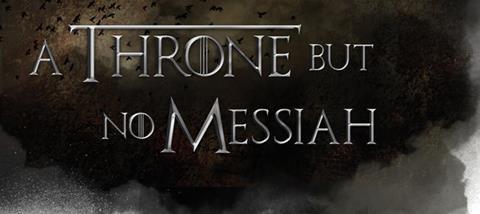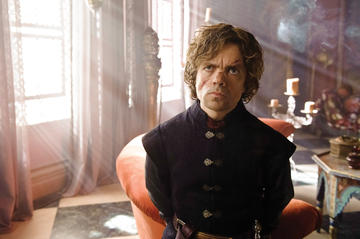
Imagine a version of The Lion, The Witch and the Wardrobe in which Edmund never has a change of heart and butchers his brother and sisters in order to assume complete control of Narnia. Or picture an alternate The Lord of the Rings, where Gandalf turns out to have been secretly evil all along and throws Frodo and Sam into the fires of Mount Doom. Into these imagined retellings add plenty of bloody violence, language that would make a sailor blush, and a censor-baiting amount of graphic sex.
Congratulations, you’ve just pictured Game of Thrones. If you’re concerned or even repulsed by this description of TV’s biggest cult show, you may also be wondering why Premier Christianity has chosen to devote two pages to it. Yet if we consider the show’s track record as satellite channel Sky Atlantic’s biggest draw, the fact that DVD box sets of the first series are lodged in every online store’s top ten list, and the reports that it’s ‘the most illegally downloaded show in television history’(!), we ignore this cultural behemoth at the peril of our own irrelevance.
Moral ambiguity
Based on the A Song of Ice and Fire series of fantasy books by American novelist George RR Martin, Game of Thrones was adapted for television by American pay per view network HBO and debuted to critical acclaim on both sides of the Atlantic in 2011. Set in the mythical world of Westeros, GoT is an epic tale of lusts ? for power, wealth, sex and violence. It’s a story of dynastic families and disunited kingdoms, and ultimately the quest for absolute dominion. The members of the various noble houses are involved in an ongoing struggle to sit on the ruling Iron Throne of Westeros, the greatest symbol of power across the Seven Kingdoms.
In their pursuit of that goal, the show’s many nefarious characters repeatedly prove they’ll stop at nothing to attain it. So infanticide, revenge, murder, maiming and even massacre are all part of the sprawling plot, but in a genre-challenging twist, justice is rarely served. Barely anyone is clearly identifiable as being good or bad; almost everyone behaves with moral ambiguity and the show’s one traditionally heroic and noble character doesn’t even survive the first season. Martin’s writing contrasts in this sense with the works of the great Christian fantasy writers CS Lewis and JRR Tolkien, and while the former man says he admires his predecessors in the genre, he rejects their redemptive approach. ‘Tolkien made the wrong choice when he brought Gandalf back,’ Martin reportedly told a convention. ‘Screw Gandalf. He had a great death and the characters should have had to go on without him.’
True to those words, Martin has made killing off major characters a hallmark of his storytelling. This has been much to the shock and horror of television series who were unfamiliar with his writing; the so-called Red Wedding episode which appeared towards the end of the show’s just-finished third season caused widespread outcry online. The episode involved the death of scores of characters, including many of the central leads.
Uncomfortably modern
While this upset viewers who had become attached to them, it may in context go on to prove the author’s point: a great story is bigger than its characters.
That’s an interesting way also of looking at the Old Testament, with which this story of dynasties of bad kings (punctuated by the occasional good one) shares some similarities. Taken in isolation, the various battles, massacres, moral lapses and rebellions of the Bible seem chaotic; woven together they become the grand story of God’s rescue plan for the world.
"There’s no God, everything is meaningless, take what you can"
That’s not to say that Martin has any religious persuasion ? each tribe has its own god or gods; some have even knowingly replaced ‘old gods’ with new ones ? and there is never any evidence that any of these redundant deities ever interact of intervene. If the series, which is as yet unfinished and will probably remain so for another decade due to the slowness of Martin’s composition, ends with a great moment of redemption, it will certainly not be a messianic reference.
Perhaps the absence of any identifiable messiah figure is why some Christians have been so dismissive of the show. The sex and bad language are enough to earn the DVDs an 18 certificate, but that’s true of various other programmes which seem to escape the ire dished out at GoT.
Perhaps that’s because the worldview unpacked in the story is so uncomfortably modern: there’s no God, everything is meaningless, take what you can.
Reliable saviour
Another major criticism of the show ? and not just from Christian circles ? has been over its treatment of women. There’s no denying that in Westeros the men wield the physical power, and often exert that sexually, but this is a very limited reading of a story that, like Shakespeare’s Macbeth, demonstrates how women can often hold even greater power and influence. Perhaps the most interesting character in the whole show (so far) is Daenerys Targaryen, a waif-like girl who journeys from being sold into a political marriage to being a powerful queen and a revered rearer of baby dragons. Far from being regressive, GoT plays with the sword-and-sandals convention of women as the weaker sex, and ultimately brings them out on top.
The critics, then, both in the religious and mainstream media, seem to be united in one thing: they haven’t really watched the show. While I can understand that the 18-certificate content may make a strong case for this approach, I’m again concerned that Christians neither wave placards at an imagined bogeyman, nor miss the opportunity to relate to one of the major cultural stories of the day. The enormous fantasy audience have become fascinated with it; do we really think the gospel has nothing to say into its bleak worldview beyond ‘sex and swearing are bad’
Helpfully, Martin himself has given us a clue. Speaking to popular culture blog Assignment X, the author said this as he again described the difference between his work and Tolkien’s: ‘I think ultimately the battle between good and evil is weighed within the individual human heart, not necessarily between an army of people dressed in white and an army of people dressed in black. When I look at the world, I see that most real living breathing human beings are grey.’ No Christian could possibly disagree with this, we’re all fallen, all sinful. GoT simply reflects the world and the humanity that we know, but with one vitally missing ingredient ? an ultimately reliable saviour.
The throne of Westeros, just like earthly power, frequently changes hands; the people fight, kill, destroy and are never redeemed. The incredible truth of the gospel is that there is a king who cannot be killed or usurped; and who offers the one thing that George RR Martin’s fantasy denies us: salvation.




























